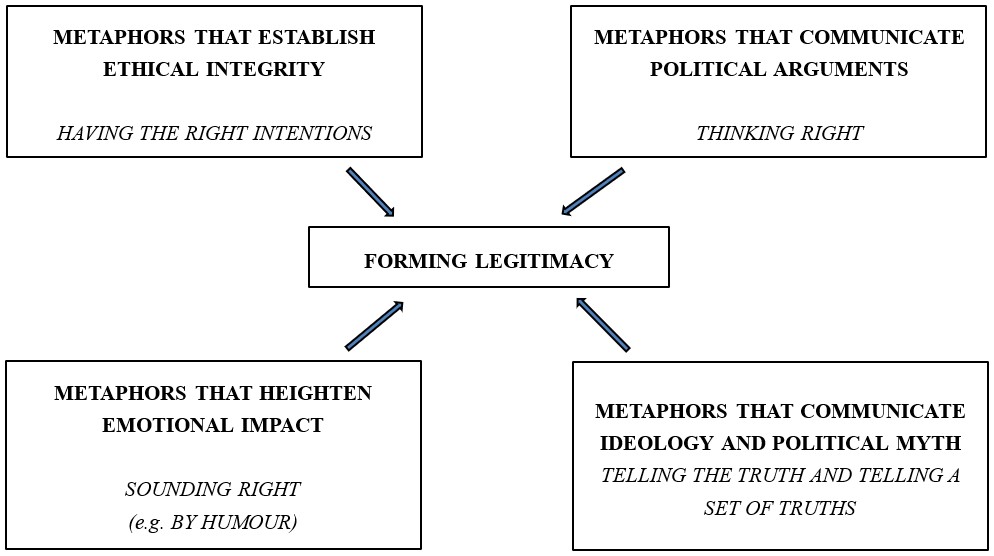Conceptual Metaphors in President Muhammadu Buhari's Political Rhetoric
Abstract
Conceptual metaphors continue to receive scholarly attention from discourse analysts taking political discourse seriously. Studies are often interested in the versatile discourse functions of metaphors; how political leaders deploy them as powerful weapons in their armory of political oratory. Therefore, this study extends the current knowledge by exploring conceptual metaphors in President Muhammadu Buhari’s political rhetoric. It was guided by two major questions: (1) What types of conceptual metaphors does President Muhammadu Buhari deploy in his political rhetoric? and (2) What rhetorical functions do the Conceptual Metaphors deployed in President Muhammadu Buhari’s political rhetoric perform? The study’s theoretical impetus was Lakoff and Johnson’s (1980) Conceptual Metaphor Theory (CMT), and Charteris-Black’s (2009) Contemporary Model of Metaphor and Political Communication was also applied in the analysis. The speeches analyzed include: (1) Muhammadu Buhari’s Presidential Primaries Speech, (2) Muhammadu Buhari’s Acceptance Speech, (3) Muhammadu Buhari’s Victory Speech and (4) Muhammadu Buhari’s (First) Presidential Inaugural Speech. The results show that President Buhari, in his political rhetoric, mostly uses HUMAN metaphors (32%), WAR metaphors (21%) and JOURNEY metaphors (16%). Moreover, further analysis revealed that Buhari mostly uses conceptual metaphors to establish his ethical integrity, heighten emotional impact and communicate his anti-corruption and political ideologies. The study concluded that conceptual metaphors are vital resources for construction of persuasion in President Muhammadu Buhari’s political rhetoric.
Downloads
References
Aremu, M. (2017). Pragmatic Analysis of Conceptual Mappings in Inaugural Speeches of Nigerian Presidents. Covenant Journal of Language Studies, 5(2).
Bornstein, R. F., & Becker-Matero, N. (2011). Reconnecting psychoanalysis to mainstream psychology: Metaphor as glue. Psychoanalytic Inquiry, 31, 172-184, 2011. https://doi.org/10.1080/07351690.2010.515874
Charteris-Black, J. (2005/2011). Politicians and rhetoric: The persuasive power of metaphor. New York: Palgrave Macmillan. https://doi.org/10.1057/9780230501706
Charteris-Black, J. (2009). Metaphor and political communication. In Metaphor and discourse (pp. 97-115). Palgrave Macmillan, London. https://doi.org/10.1057/9780230594647_7
Charteris-Black, J. (2009). Metaphor and political communication. (eds) in Musolff, A., & Zinken, J. (Eds.). (2009). Metaphor and discourse (pp. 233-247). Basingstoke/New York: Palgrave Macmillan. https://doi.org/10.1057/9780230594647_7
Chilton, P. (2004). Analysing political discourse: Theory and practice. Routledge. https://doi.org/10.4324/9780203561218
Creswell, J. W. (2012). Education research: planning, conducting and evaluating quantitative and qualitative research. Boston/New York: Pearson
Dörnyei, Z. (2007). Research methods in applied linguistics: Quantitative, qualitative, and mixed methodologies. Oxford University Press.
Escudero, M. P. G. (2011). Barack Obama’s inaugural address: Metaphor and values as captivating strategies to celebrate a presidency. Pragmalingüística, (19), 44-55. https://doi.org/10.25267/Pragmalinguistica.2011.i19.03
Hu, X. (2010). A study on conceptual metaphors in presidential inaugural speeches. (eds) in School of Teacher Education, Kristianstad University.
Jeffery, M., & Albert, N. K. (1996). Metaphor: Implications and Applications. New Jersey: Lawrence Erlbaum Associations Publishers.
Jones, R. H. (2012). Discourse analysis. London and New York: Routledge.
Kamalu, I., & Iniworikabo, P. B. (2016). Metaphors in selected political speeches of Nigerian democratic presidents. California Linguistic Notes, 40(2), 71-84.
Kovecses, Z. (2002). Metaphor: A Practical introduction. Oxford: Oxford University Press.
Lakoff, G., & M, Johnson (1980). Metaphors We Live By. Chicago: Chicago University Press.
Linkevičiūtė, V. (2019). Conceptual metaphors in Donald Trump’s political discourse: Politics Domain (2018). Kalbų Studijos, (34), 46-55. https://doi.org/10.5755/j01.sal.34.0.21886
Lu, L. W. L., & Ahrens, K. (2008). Ideological influence on BUILDING metaphors in Taiwanese presidential speeches. Discourse & Society, 19(3), 383-408. https://doi.org/10.1177/0957926508088966
Malah, Z. (2016). Signals from the Surface of Texts: How Lexical Cohesion Reflects Writers’ Tones in Nigerian Newspaper Editorials. International Journal Language and Linguistics, 3.
Malah, Z., & Idriss, A. (2016). Sociolinguistic Exploration of Nigerians’ Political WhatsApp Communities: A Case Study of President Muhammadu Buhari Supporters’ groups. Research Journal of English Language and Literature, 4(4), 560-572.
Matthews, B., & Ross, L. (2010). Research methods. Pearson Higher Ed.
McGlone, M. S. (1996). Conceptual metaphors and figurative language interpretation: Food for Thought? Journal of memory and language, 35(4), 544-565. https://doi.org/10.1006/jmla.1996.0029
Merriam, S. B., & Tisdell, E. J. (2009). Qualitative research: A guide to design and implementation. John Wiley & Sons.
Mio, J. S., Riggio, R. E., Levin, S., & Reese, R. (2005). Presidential leadership and charisma: The effects of metaphor. The Leadership Quarterly, 16(2), 287-294. https://doi.org/10.1016/j.leaqua.2005.01.005
Moser, K. S. (2000, June). Metaphor analysis in psychology—Method, theory, and fields of application. In Forum Qualitative Sozialforschung/Forum: Qualitative Social Research (Vol. 1, No. 2).
Musolff, A. (2004). Metaphor and political discourse. Analogical Reasoning in Debates about Europe. Basingstoke, 14. https://doi.org/10.1057/9780230504516
Pasaribu, T. A. (2016). Domains of political metaphors in presidential speeches. LLT Journal: A Journal on Language and Language Teaching, 19(2), 96-104.
Prados, M. D., & Peñuelas, A. B. C. (2012). Cohesion in American political rhetoric: The Gettysburg Address, I have a dream and Obama's Inaugural Address/La cohesión en la retórica política americana: Los discursos Gettysburg Address, I have a dream y el de la Investidura de Obama. Complutense Journal of English Studies, 20, 37. https://doi.org/10.5209/rev_EIUC. 2012.v20.39994
Ramanathan, R., Hoon, T. B., & Paramasivam, S. (2018). Metaphors in Political Tweets during National Elections. Pertanika Journal of Social Sciences & Humanities, 26(2).
Semino, E. (2008). Metaphor in discourse. Cambridge: Cambridge University Press.
Tavakoli, H. (2010). A dictionary of research methodology and statistics in applied linguistics. Tehran:Rahnama press.
Verbrugge, R. R., & McCarrell, N. S. (1977). Metaphoric comprehension: Studies in reminding and resembling. Cognitive psychology, 9(4), 494-533. https://doi.org/10.1016/0010-0285(77)90018-4
Wilson, D. (1994). Language and Understanding. Oxford: Oxford University Press.
Wodak, R. (2009). The discourse of politics in action: Politics as usual. Springer. https://doi.org/10.1057/9780230233683
Xue, J., Mao, Z., & Li, N. (2013). Conceptual metaphor in American presidential inaugural addresses. Theory and Practice in Language Studies, 3(4), 678. https://doi.org/10.4304/tpls.3.4.678-683


This work is licensed under a Creative Commons Attribution 4.0 International License.
Copyright for this article is retained by the author(s), with first publication rights granted to the journal.
This is an open-access article distributed under the terms and conditions of the Creative Commons Attribution license (http://creativecommons.org/licenses/by/4.0/).









1.png)









1.png)











